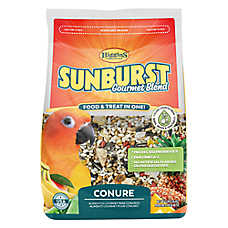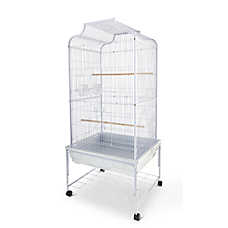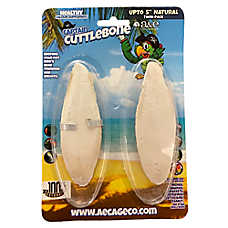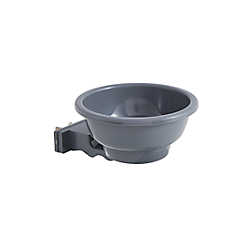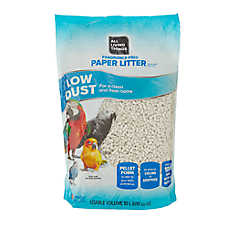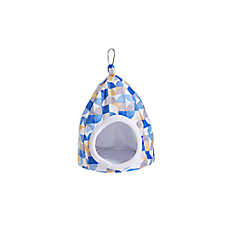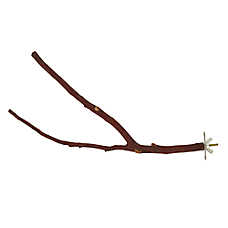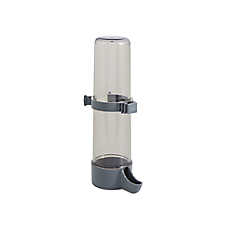Conure Care Guide
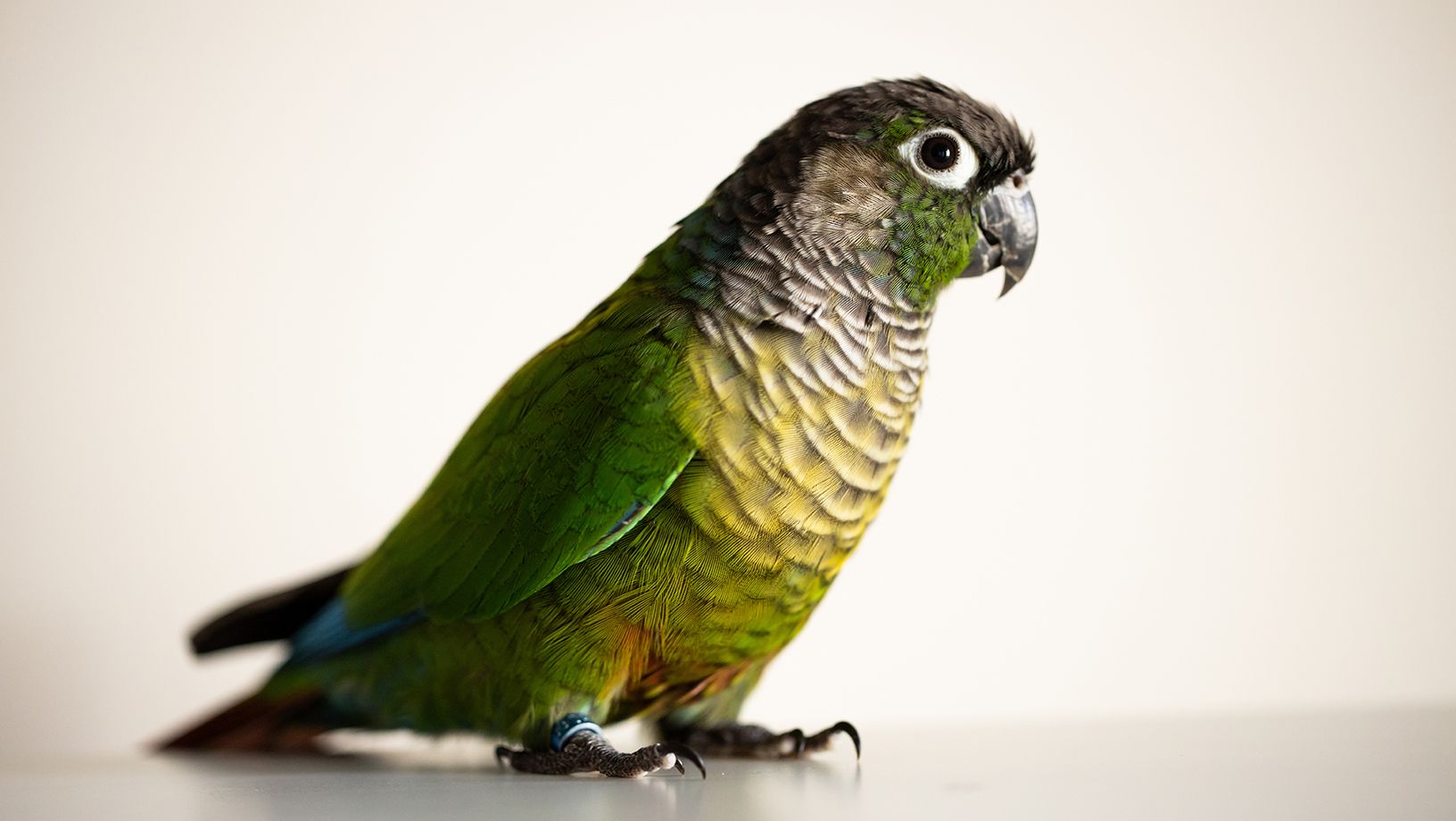
In this Article
Comical Conures!
Conures are a variety of parrot that come in all sizes and colors. These curious birds are native to South America and are known to be inquisitive and quite bold compared to some other birds. Conures are sometimes referred to as “clowns of the bird world” due to their playful personalities! They generally love to be around people, often even climbing into their owner’s shirt for a cuddle, and they’re so smart that some individuals can even be taught tricks!
Conure species profile
Size: Conures can range in size depending on the variety. Green-cheek conures average around 10”, whereas Sun conures average around 15" (38 cm) from head to end of tail.
Lifespan: Conures can live as long as 20 years.
Behavior: Conures have playful personalities and can be “chatty”. They’re quite intelligent, about on par with a human toddler, and are even capable of learning to “speak” and mimic sounds.
Temperament: Conures are social and full of personality. They are flock-oriented birds, and typically do well with other birds in the home. However, they consider their humans to be equally part of the flock and will happily spend their days as an only bird-child with you. They will need at least an hour of daily interaction with their humans to be happy and fulfilled.
Setting up your Conure habitat!
Conures need a spacious, enriching, and social environment to stay happy and healthy.
Enclosure size and placement
- Minimum size: 20” x 20” x 30”
- Recommended size: 32” x 23” x 36” or larger
- If housing multiple birds, increase the cage size accordingly
- Place the enclosure in a room with regular human activity so your conure feels part of the “flock”
- Keep the cage at or below eye level, away from:
- Kitchens and cooking fumes (especially non-stick cookware)
- Strong odors and smoke
- Drafts, windows, and direct sunlight
- Cover the cage at night to help your bird feel safe and secure
Perches and enrichment
- Provide at least three toys to encourage exercise and mental stimulation
- Rotate toys regularly to keep your bird engaged
- Include puzzles, chewables, and foraging items
- Place a cuttlebone in the enclosure to support beak and bone health
- Add a T-stand or playpen so your bird can safely play outside the cage (indoors only)
- Include multiple perches of varying thickness and height for healthy foot movement
- Add a ladder perch for extra climbing opportunities.
- Avoid placing perches directly above food or water bowls to prevent contamination
- Use a liner at the bottom of the enclosure and replace as needed to maintain cleanliness. Cages should be spot cleaned daily, and fully cleaned weekly.
Bathing and humidity
- Offer a birdbath or shallow dish for splashing and bathing 2-3 times a week.
- Alternatively, if your bird prefers showers to baths , gently mist your bird with warm water 2–3 times a week
- Provide clean, fresh water for drinking in a bowl or bird water bottle at all times
Conure Care and Feeding
Pellet food: This is your bird’s primary source of food and nutrition. Remove old food and refill with fresh food daily. Keep the bowl about ¾ full so your bird can eat when they’re hungry
Fresh veggies, fruit, and more: Offer your bird leafy green vegetables, fruits and whole grains every day to help provide a well-rounded and interesting diet to keep your bird healthy.
Treats: nuts, seeds, millet sticks, foraging treats. Offer treats once or twice a month in limited quantity to help prevent obesity
Water: Provide clean, fresh water for your bird at all times either in a water bowl or via a bird water bottle. You may need to provide a second water bowl, or at least check your bird’s water regularly as conures are known to enjoy dunking their food in their water.
Never feed your bird chocolate, sugar, fried foods, avocado, or human junk food. These foods can make your bird very sick.
[When to see a vet]
In addition to regularly scheduled appointments, contact your avian veterinarian if you notice the following signs:
- long periods sitting at the bottom of the enclosure
- decreased appetite or weight loss
- less activity and grooming
- feathers fluffed for long periods of time
- sneezing; discharge from eyes, nose or mouth
- runny droppings for more than two days
- constantly plucking feathers or feathers are falling out
- beak over gown/ not closing normally
Go to “find a vet” on AAV.org for help finding an avian veterinarian in your area.
SHOPPING CHECKLIST
- Cage habitat
- Minimum size 20”x 20” x 30"
- Recommended size 32”x 23”x 36” or larger
- fortified conure pellet diet
- seeds, fruits and veggies can be used in addition for treats or enrichment to chew on
- food bowls
- water bottle and/or bowl
- at least two perches (each a different thickness and height)
- A misting spray bottle and/or bird bath (for bathing)
- Ladder perch (additional to 2 other perches)
- toys
- habitat liner
- habitat cover (for nighttime)
- cuttlebone
Ready to learn more? This guide is a great starting place, but we encourage you to do more research on the individual species that you are keeping so that you can be as successful as possible! Related guides:
FAQs
Are conures good pets for beginners?
Conures can be great for first-time bird parents who have the time to socialize and interact daily. They're playful and affectionate, but they do require attention, mental stimulation, and out-of-cage time to thrive.
Conures can be great for first-time bird parents who have the time to socialize and interact daily. They're playful and affectionate, but they do require attention, mental stimulation, and out-of-cage time to thrive.
Can conures talk or mimic sounds?
Some conures can learn to mimic words and sounds, especially if exposed to them consistently. While not as talkative as larger parrots, they often pick up whistles, tones, and short phrases.
Some conures can learn to mimic words and sounds, especially if exposed to them consistently. While not as talkative as larger parrots, they often pick up whistles, tones, and short phrases.
Do conures need a companion?
Conures are very social and love interaction, but they don’t require another bird if they get plenty of attention from their humans. If you’re gone for long periods, consider providing more toys or even another bird, with a gradual introduction.
Conures are very social and love interaction, but they don’t require another bird if they get plenty of attention from their humans. If you’re gone for long periods, consider providing more toys or even another bird, with a gradual introduction.
How often should I clean my conure’s cage?
Spot-clean daily by removing droppings and uneaten food. Replace the liner as needed and deep clean the enclosure weekly to keep your conure healthy and the habitat odor-free.
Spot-clean daily by removing droppings and uneaten food. Replace the liner as needed and deep clean the enclosure weekly to keep your conure healthy and the habitat odor-free.
Why does my conure squawk or scream sometimes?
Vocalizing is normal for conures, but sudden changes may signal boredom, loneliness, or a need for attention. Ensure your bird has enough enrichment and daily interaction. If screaming becomes excessive, check for environmental stressors or consult a vet.
Vocalizing is normal for conures, but sudden changes may signal boredom, loneliness, or a need for attention. Ensure your bird has enough enrichment and daily interaction. If screaming becomes excessive, check for environmental stressors or consult a vet.
